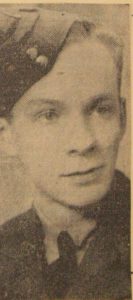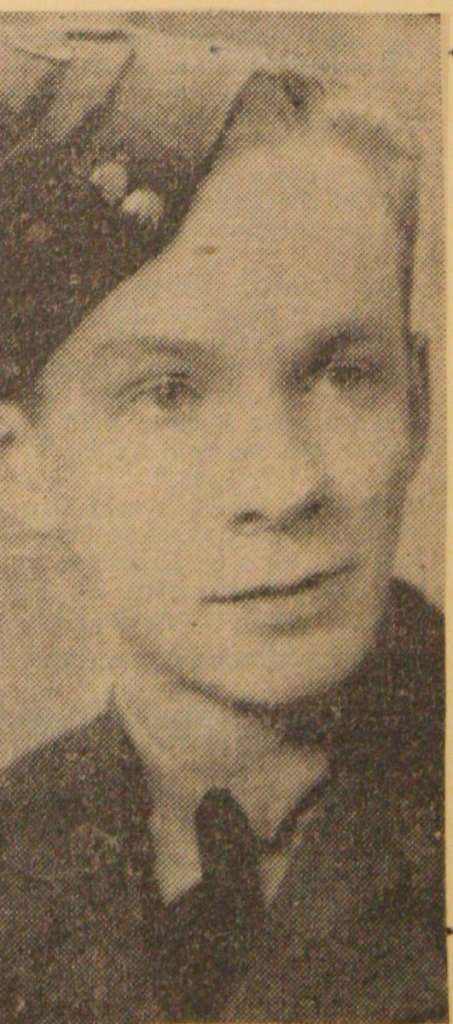
| Rank | Flying Officer, Sergeant, AC2 |
| Service # | J42691, R197004 |
| Unit # | R.C.A.F. |
| Resident | 205 Joseph St., Chatham |


RICHARD JAMES of 205 Joseph St., Chatham, ON. Prior to the war Richard was a member of the editorial staff of the Chatham Daily News. He would, later in life, be the editor of the Toronto Globe & Mail paper. The son of Mr. and Mrs. James A. Doyle of Joseph St., Chatham.
Richard enlisted November of 1942 in the RCAF. Before going to St Catharines he was stationed at Edmonton, AB. and Vancouver, BC.
The CDN 17/O4/43 reported that he was stationed at No. 9 E.F.T.S at St. Catharines. The CDN 24/12/43 reported that LAC Doyle was home on a Christmas furlough visiting with his parents.
Richard graduated as a Air Bomber at No. 4 Air Observers School in London, ON. The CDN 22/03/44 reported that P/O Doyle departed for Nova Scotia after a two week leave with his parents in Chatham. The CDN 15/05/44 reported that PO. Doyle was serving overseas.
The CDN 15/11/44(P) reported that Richard J. Doyle had been promoted to the rank of Flying Officer.
Trained in Manning Depot, Vancouver, St. Catherines and Crumlin. Served eighteen months in Canada. Went overseas in May 1944 and served in England. Promoted Sergeant to Flying Officer. Awarded ribbon for flying prisoners from Holland also service ribbons. Discharged October 1945.
The following letter written by F/O Doyle while “waiting for a boat” to take him back home.
Curators Note: I have never come across anything so well written and in such depth by a service man of what it was like for those overseas waiting to return home. This is as it appeared in total in the Chatham Daily News of 7 August, 1945.
REPATREATION
“If Dreamland is a place where dreams come true, then it must be on the other side of the Atlantic. If it is a place where dreams are born and bred then it is to be found here at this RCAF repatriation central a few miles from ancient York, where more than a thousand aircrew veterans are eating, sleeping and living dreams of home.
The dreams may take different shapes and forms but they are unmistakable and obvious even to the uninitiated. They may be only a couple of fellows shooting the guff about thick steaks and French fries, or there may be a crowd of a hundred discussing the prospects of selling vacuum cleaners in Toronto next spring. It makes no difference for cloud castles aren’t confined to quiet corners or milling mobs. They are the bread and butter of the chaps waiting for their final shipping orders.
RCAF Rufforth was once an airdrome where newly trained crews converted on to four-engined bombers they were destined to fly on operations. Today the dispersals are empty, the runways deserted and the fields are overgrown with weeds and grass. The windsock still hangs by the control tower but is only a poignant reminder of other days.
In the dispersed living quarters however, the picture is entirely different. Tin Nissen huts, which once held ten beds, are now accommodating up to fifteen men. Messes that once served meals to less than a hundred men are now providing for five times that number. The trim administrative offices, which once were noted for quiet efficiency, are now in a state of never-ending turmoil as orders and counter-orders stream in form headquarters. Repatriation is a complicated and cock-eyed thing. Above all nothing is definite – and the folks at home who wonder why their Johnny doesn’t tell them at least what week he will be sailing, would do well to remember that Johnny – who is more befuddled than they are – hasn’t the foggiest notion himself.
Men are posted to this unit from the various squadrons where they filled out countless forms relating to their service experience and their preference for future duties. On arrival they will fill out more forms and in the true service tradition they are form-filling until their boat leaves Liverpool. Those who have volunteered for service in the Far East are immediately sorted out and given priority posting to Canada. Those who have indicated a desire to do occupational duty are posted to Canadian squadrons from whence they will be given a thirty-day leave at home. The remainder – and by far the greater majority – are sorted into various repatriation categories. Those who have had only a brief overseas experience are sent to other holding units. Those with long period of service behind them are sent on to coastal camps where they will be available for rush sailing orders. The hundreds who are left begin the “great wait” and for many that has already stretched into six weeks.
If dreams are food during this period of making time – then rumors are the resultant indigestion. Rumors roar through the camp like tornados and some of them assume such aspects of authenticity that Commanding Officers himself, must be tempted to believe they are true. In the morning one may hear that all personnel are to remain in Britain for three months while in the evening everyone will be convinced that five hundred men are to leave England at once aboard a converted Detroit-Windsor ferry with Eleanor Roosevelt as first navigator. Nastiest of all tall stories was the one, which claimed that Aldershot rioters were to be given posting priority. The Aldershot rioters were anything but representatives of Canadians in England today. No one resents their actions more than the men who are still in this country where people may drop their ’H’s’ but have no difficulty in pronouncing “hospitality.”
Idleness is, perhaps the serviceman’s greatest enemy while he waits for that Halifax-bound troopship. Aside from a roll call each morning, he has no duties. He reads every newspaper from cover to cover and against his will digests all of the petty propaganda concerning England’s election in which he wasn’t even interested in the first place. He wonders into York, which is the mecca for men of a half dozen similar camps, and he finds that he must queue for the cinemas, the tea shoppes and the pubs. Rather than join the even-longer queue in his mess hall he has his supper in the city and finds it is either very dull or very expensive. Fresh fruit is cheaper now and a peach only costs one dollar and seventy-five cents. Unfortunately it’s a peach that Virg McGuigan or Harold English would be ashamed to put on the market. A half-dozen strawberries with a bit of canned milk costs fifty cents and a blackmarket steak about the size of two half dollars sells for a dollar and a quarter Bus service between the camps and the city is inadequate and the taxi drivers are making a fortune.
Camp authorities however are fully cognizant of these conditions and in spite of shortages of staff they are making every effort to provide useful courses and camp activities that will keep the men busy. Personnel Councilors are on hand to discuss every phase of civilian life in Canada. They are willing to give authoritative advice on post-war possibilities in dozens of industries and businesses. The have all of the “gen’ on gratuities and government loans and they encourage the men to start planning now for the careers that must commence when green and grey tweeds replace the battered service blues.
Education officers work day and night arranging classes in countless subjects – fox farming, languages, floriculture, engineering, shorthand, salesmanship and hotel keeping. A rich store of literature on the various peacetime professions is available and movies are shown daily in an effort to reveal to the grounded fliers just how much their country has changed and developed since it went to war nearly six years ago. Legal advisers are n hand to discuss problems that may have developed at home while a man has been abroad. An airman may want to know how to get rid of forty shares of gold stock or an unfaithful wife. No matter what his dilemma is a solution will be found for him.
In addition there are special shops where an ex-pilot or air gunner can try his hand at leather work, model building or photography. He can join special discussion groups that are trying to sort out the problems of returning to civilian life.
The work of the auxiliary services in providing recreation and entertainment has been amazing. No night passes without some station activity – movies, a stage show, a dance, a roller skating party or concert. In the afternoons golfing and swimming expeditions are organized. Sports of every kind are provided for and “Canada House” the station recreation centre is always open with its jam sessions, reading, writing and games rooms.
But no amount of organized or unorganized activity could prevent the men from spending nine tenths of their time thinking of home. The currently popular English tune is “Coming Home” is almost an anthem and odd indeed is the man who does not spend half of his time thinking of that first meeting with the folks, the wife or girl friend. Just to walk down the familiar street again will be an adventure and no man whether his home is in Kamloops or Chatham, Thamesville or Truro will deny that the time drags heavier and the goal seem brighter with each day that passes. They don’t particularly want civic receptions or special attention. They only want what they left behind them – what they hope will be unchanged when they return. CDN 7/08/45.
Reported returning from overseas aboard troop ship “Alcantara” CDN 1/08/45, expected to arrive at Quebec City the 5th of August, 1945 (P). Arrived from overseas. CDN 8/08/45(P) CDN Arrived in Chatham from overseas duty. CND 9/08/45(P).
Notice something wrong with this record? Or, do you have something to add? Report it using our online form.


